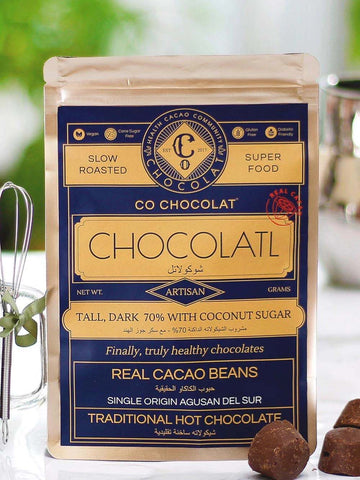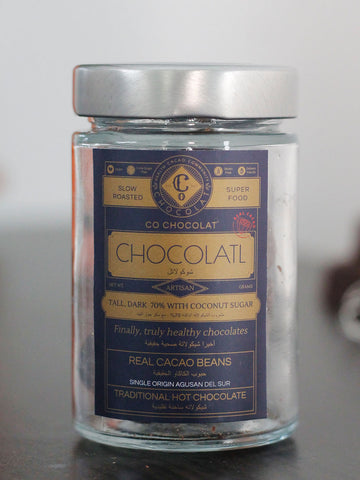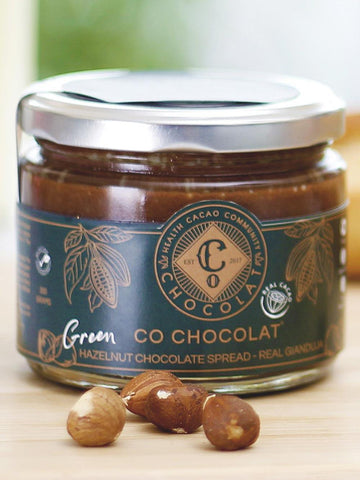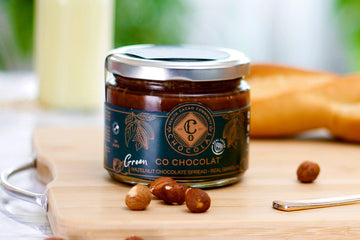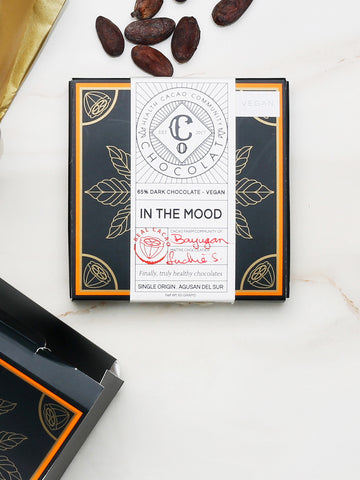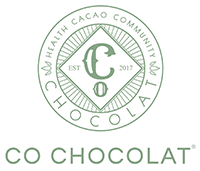The Perfect Date (Part 1)
 7.2 min read
7.2 min read
The word “date” normally brings images of that fleeting moment of romantic love. One date could just be a single encounter – tried once and that’s it, or, it could be a date that blossoms into something lasting, beneficial, reliable and it makes a person happy. Here at Co Chocolat, DATES, and we mean the fruit of the date palm is our great love next to cacao. It is sweet, it is reliable, and it always makes us happy. It may be wrinkly like an old grape, but we love it all the same because it is a powerhouse of health benefits. This article pays homage to this great love ❤ - our perfect date.
Dates are grown in many regions of the world. They’re native to North African regions and the Middle East. Dates go very far back in history. Remains of dates have been found on a number of Neolithic sites particularly Syria and Egypt. This means that man was eating them as far back as 7,000 to 8,000 years ago. [1]
Picture taken from Jonathan Drori
Just like cacao, dates are tagged as a “superfood”. While there isn’t exact or official definition of superfood, there is a discussion made by Dr. Cannarozzi, medical director of University of Central Florida on which she defined superfood as a non-medical term referring to foods that have health-promoting properties. They usually have a high content of antioxidants, vitamins and other nutrients. She added that superfoods are not meant to cure specific ailments, but rather work to enhance overall wellness.
Nutritional Benefits of Dates
Fiber
Dates contain both soluble and insoluble fiber, which help regulate blood sugar, keep us satiated, lower blood cholesterol, and keep bowels healthy by preventing constipation. One-half cup of dates provides 6 grams of fiber or around 22% of the daily value for fiber. [2]
Natural Sugar
Dates are full of fructose (fruit sugar). But despite the large amount of fructose, it is also relatively low in glycemic Index and does not rapidly raise blood glucose when consumed. A study was made in 2011; studying people with Diabetes consuming five different types of dates and their blood glucose monitoring did not have any significant changes compared to healthy people. The findings point to the potential benefits of dates for diabetic subjects when used in a healthy balanced diet. [3]
Chopping, boiling, pureeing and squeezing out the liquid in dates will give you date syrup. It is quite flavorful and you can use it wherever you might like. If you check out our recipes here in Co, you’ll find that we frequently replace refined sugar with dates in its different forms.
Minerals
Ten minerals were reported, the major being selenium, copper, potassium, and magnesium are significantly found in dates. [4] These minerals are vital in healthy bone development and strength. It also has impressive levels of iron beneficial for people suffering from anemia.
Vitamins
It contains vitamins such as Vitamin B6, Vitamin A, and Vitamin K.
-
Vitamin B6- maintains healthy metabolism, skin health, eye health, and liver function
-
Vitamin A- is important for growth and development and good vision
-
Vitamin K- plays a role in helping blood clot and prevents excessive bleeding
Antioxidants
Dates have the highest concentration of polyphenols among dried fruits. [5] Polyphenols are generally involved in defense against ultraviolet radiation or aggression of pathogens.
Glycemic Index and Glycemic Load
The glycemic index (GI) is a numerical way of describing how carbohydrates in foods affect blood sugar levels. It measures how quickly a serving of food converts to sugar.
-
Low on the glycemic index (< 55 in the glucose scale) appears to have less of an impact on blood sugar levels after meals.
-
Medium glycemic index (56-69 in the glucose scale) does not rapidly increase blood sugars level
-
High Glycemic index (70+ in the glucose scale) foods generally make blood sugar levels higher.
The Glycemic Load (GL) is an extension of the GI, taking into the account the quantity of carbohydrates. The GL is obtained by multiplying the GI value by the carbohydrate content of food.
The following ranges are applied to determine the GL of a particular food.
-
Low GL: 0 to10
-
Medium GL: 11 to 19
-
High GL: 20 and over
In a published article of Annals of Saudi Medicine (ASM), the study determined the Glycemic load, Glycemic Index and glycemic response for 17 common dates in Saudi Arabia and concluded that the identification of date varieties with lower glycemic responses may help lower the GI of the diet of both healthy and diabetic Saudi individuals which could in turn, promote the prevention and management of chronic conditions including diabetes and obesity. Nevertheless, further studies are required to compare the nutritional and metabolic characteristics of fresh and sun-dried date varieties, as well as other date products available on the market.
To make sense of all these data, you must simply remember that all these dates varieties are great for diabetics when consumed in moderation. The American Diabetes Association recommends to have > 25 grams of fiber per day which you can get by consuming vegetables, fruit, nuts, seed, and whole grains. Fruit servings will depend on your caloric and carbohydrate requirements as given by your dietitian. But the best ones to choose with acceptable GL and GI are:
-
Ajwah – lowest with a score of 55.9 (GI) and 8.5 (GL)
-
Shaqra – low with a score of 42.8 (GI) and 9.2 (GL)
-
Sukkary – low with a score of 43.4 (GI) and 11.7 (GL)
-
Ruthana – low with a score of 52.5 (GI) and 11.7 (GL)
-
Nabtat-seyf – low with a score of 54.4 (GI) and 11.8 (GL)
While the best dates to use for sweetening dishes and pre-workout would be:
-
Sellaj – with the highest score of 74.6 (GI) and 24 (GL)
-
Um Kabar – high with the score of 58.7 (GI) and 22 (GL)
-
Medjool – high with score of 55.3 (GI) and 17.2 (GL)
-
Nabtal- all – high with the score of 59.9 (GI) and 16.3 (GL)
-
Maktoomi – hight with the score of 71 (GI) and 16.1 (GL)
